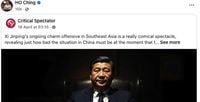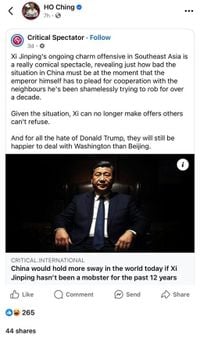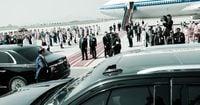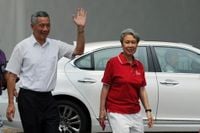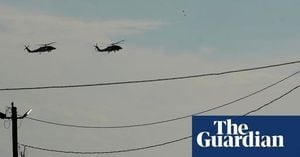On April 18, 2025, a Singaporean media outlet published a provocative article that criticized Chinese President Xi Jinping's leadership style, likening him to a 'gang boss'. This commentary has sparked significant interest, particularly after it was shared by Ho Ching, the wife of Singapore's former Prime Minister Lee Hsien Loong, on her Facebook page on April 21, 2025. The article, written by Michael Petraeus, founder of the Singaporean platform "Critical Spectator", raises questions about China's international standing and Xi's approach to foreign relations.
Petraeus's piece, titled "If Xi Jinping Had Not Acted Like a Gang Boss in the Past 12 Years, China Would Have Greater Global Influence Today", asserts that Xi's recent charm offensive in Southeast Asia appears desperate and misguided. The commentary suggests that Xi's attempts to win over nations he has previously bullied highlight the precarious position of the Chinese Communist Party (CCP) today.
The article emphasizes that Xi's leadership has been characterized by aggressive and predatory tactics, which have alienated many neighboring countries. It states, "Xi has been acting like a gang boss, making offers that cannot be refused, and now expects his victims to treat him as a friend and partner." This stark analogy evokes the image of a mafia leader, drawing parallels to the fictional character Don Corleone from the "Godfather" series.
Moreover, the piece critiques the CCP's contradictory stance on protectionism. While China publicly opposes protectionist measures, it simultaneously promotes the contentious 'Nine-Dash Line' in the South China Sea, constructs military facilities on disputed islands, and uses coast guard vessels to intimidate neighboring fishing boats. Such actions have understandably raised alarms among Southeast Asian nations, making it difficult for them to trust China.
In addition to its aggressive maritime policies, the article highlights China's failure to meet its commitments made upon joining the World Trade Organization (WTO). It points out that the CCP has imposed strict restrictions on foreign enterprises and has not followed through on promises to open its markets or facilitate technology transfer. This inconsistency casts doubt on China's criticisms of other countries engaging in protectionism.
Petraeus also discusses the controversial 'One Belt, One Road' initiative, which has been met with skepticism in Southeast Asia and is often labeled a 'debt trap'. Critics argue that this initiative is designed to extend China's influence while burdening participating countries with unsustainable debt.
The commentary further asserts that China's attitude toward Europe mirrors its approach to the United States. The article claims that Xi's support for Russia's military actions in Ukraine represents a broader confrontation with the West, stating, "This is seen as a war against the entire West." This aligns with growing international concerns regarding China's foreign policy and its implications for global stability.
Ho Ching's decision to share this critical article is particularly noteworthy, given her background and connections within the Singaporean and Chinese political landscapes. She has long served on the advisory board of Tsinghua University's School of Economics and Management, a position that places her at the nexus of business and politics in China. Her public endorsement of such a critical viewpoint raises questions about the current dynamics within the CCP and the potential for internal dissent against Xi's leadership.
The article's publication and Ho's endorsement come at a time when Xi's administration is reportedly facing increasing scrutiny from within the party. Speculations about a potential power struggle have surfaced, especially as rumors suggest that Xi may soon step down.
Cai Shenkun, an independent commentator, expressed skepticism about Ho's motivations. He questioned whether her actions were a calculated move to signal a shift in Singapore's stance toward China, given the significant investments Temasek Holdings has in the country. He noted, "Is Ho Ching aware of more internal information within the CCP? Is Xi being held accountable for his diplomatic failures?" This commentary adds another layer of intrigue to the unfolding narrative.
As the article continues to circulate, it reflects broader sentiments within the ASEAN community regarding China's assertive policies and the challenges they pose. The criticism of Xi's leadership style resonates with many who have experienced the ramifications of China's aggressive tactics firsthand.
Notably, the historical ties between Singapore's leadership and Chinese political figures like Zhu Rongji and Wang Qishan further complicate the situation. These relationships have been characterized by mutual respect and collaboration, but Ho's public criticism of Xi could signal a significant shift in this dynamic.
In a broader context, the article serves as a reminder of the complexities of international relations in the region. With growing tensions between China and its neighbors, the potential for conflict remains high. As countries navigate their relationships with China, the stakes are increasingly high, and the need for transparent and constructive dialogue has never been more critical.
As the situation develops, analysts will be watching closely to see how Xi responds to this criticism and whether it signifies a larger trend of dissent within the CCP. The implications of Ho Ching's actions may extend beyond the realm of personal opinion, potentially influencing Singapore's diplomatic stance and its future interactions with China.
In conclusion, the article by Petraeus, amplified by Ho Ching's endorsement, underscores the precarious position of the CCP under Xi Jinping's leadership. It raises important questions about China's future on the global stage and the potential for a shift in regional dynamics as countries reassess their relationships with the rising superpower.
